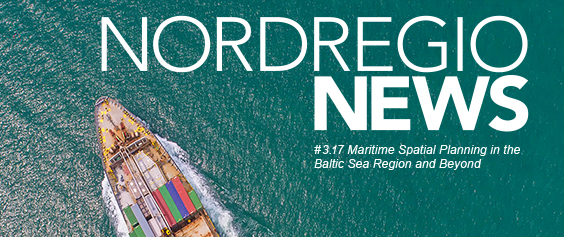Maritime Spatial Planning (MSP) is about creating the future we want. It is about providing predictable conditions. It is also about local fishermen, clean energy, national security and the small shrimp you find among the seaweed.
Ideally, it is a democratic, inclusive and participatory process that leads to a spatial plan showing the most effective and sustainable way of using our seas. But how do we make decisions about the way our seas are used, particularly when national borders divide a common/joint sea? The Baltic SCOPE collaboration partly answered this question and laid the foundation for national plans that should fit better together with the national plans of neighbouring countries in the future.
New tools and knowledge that foster pan-Baltic thinking
The Baltic SCOPE project tackled cross-border maritime spatial planning in the Baltic Sea. Baltic SCOPE ran for two years, from 2015 to 2017. Project partners were the planning authorities of Denmark, Estonia, Germany, Latvia, Poland and Sweden and included the organizations Helsinki Commission (HELCOM), Visions and Strategies Around the Baltic Sea (VASAB), Nordregio and the Finnish Environment Institute SYKE. In addition, Finland, Lithuania and Mecklenburg-Vorpommern were associated partners.
Baltic SCOPE increased collaboration and co-ordination between national authorities, working with fisheries, energy, environmental protection, shipping and maritime spatial planning, and also between some other key stakeholders in the Baltic Sea region. The project provided planners involved in the project with new knowledge, tools and methods to better address transboundary issues. Moreover, through the development of stronger ties between the planning authorities, a pan-Baltic approach to maritime spatial planning was fostered.
Challenges regarding novelty, difference and power balance
A transboundary MSP process is not free from complications. Because MSP is a new approach in Europe for organizing sea space, countries have been required to establish institutional structures for undertaking this task. In many sea basins, authorities and stakeholders from neighbouring countries have built up sea-planning expertise at the national level as well as in collaboration with neighbouring countries. Collaborating across sea basins, as is the case in the Baltic Sea, becomes particularly challenging as countries have different administrative and governance structures within which MSP is embedded. In addition, governance structures, including the regulation of relevant sectors, overlap at times and are nested across different levels of public administration and geographical scales.
Article continues below
MSP is also about balancing sectoral interests, for example, those of windfarms and shipping lines. This can be challenging as there is a clear imbalance in the level of sectoral influence over the seas, which is often predetermined by international or global agreements (e.g. the EU’s Common Fisheries Policy and International Maritime Organization), as well as by national interests and politics. Furthermore, national priorities and interests are often significantly different and can sometimes conflict with each other, with some countries prioritizing environmental protection, while others the exploration of new economic opportunities. There are also a number of practical and logistical challenges to overcome. While a key aspect of cross-border co-operation in MSP involves the sharing of data and mapping, data are often fragmented, unreliable or simply incompatible across borders because of differences in methods of data collection. Other challenges for partners in the Baltic SCOPE project include language barriers, differences in planning traditions, different stages of the planning processes and the presence of a few politically sensitive issues related to unsolved border conflicts, accessibility to ports and environmental concerns.
Open, informal and creative interactions – producing useful results
On the positive side, the effective rearrangement of administrative structures has allowed for the allocation of MSP activities within existing governance systems. The Baltic SCOPE project constituted an informal platform for sharing information and experiences from which partners of different countries learned from each other and built new approaches together for dealing with complex transboundary MSP issues. Despite some of the inherent difficulties, the creativity, openness and solution-orientated approach of planners and experts in developing new methods and tools for planning that involves the sea has been essential for a successful cross-border collaboration. The presence of inter-governmental institutions such as HELCOM and VASAB and the HELCOM-VASAB MSP Working Group, have significantly supported and propelled the collaborative efforts of Baltic SCOPE countries. At the same time, these organizations are absorbing the lessons learned from Baltic SCOPE, and other collaborative projects, to institutionalize the learning process.
The project has resulted in a number of interesting products and outcomes, including a deeper understanding between planners across the Baltic Sea region, common maps on green infrastructure and shipping activities, harmonized data, planning evidence (methods and tools), checklists for carrying out MSP using an ecosystem approach and policy recommendations for cross-border maritime spatial planning. The project also suggested planning solutions is conflict areas. The results are primarily useful for planners and policymakers, but also for a broad range of stakeholders and academics.
The Baltic SCOPE results were fed directly into the countries’ planning processes, and are used by planning authorities nationally and internationally, in the HELCOM-VASAB Joint Working Group on MSP, HELCOM, VASAB and in sister projects.
The project supported the implementation of the EU Directive on Maritime Spatial Planning. The European Commission and the project partners financed Baltic SCOPE.
In the long run, Baltic SCOPE makes an important milestone on the road towards developing coherent national maritime spatial plans across the Baltic Sea, for the sustainable use of marine resources and a sustainable development of the Baltic Sea region. Maritime spatial planning is about creating a future we want; it is about the journey as much as the destination – the collaboration, as much as the plans.
Join us at www.balticscope.eu.
This article is a part of Nordregio News #3.17. Read the full issue here:



